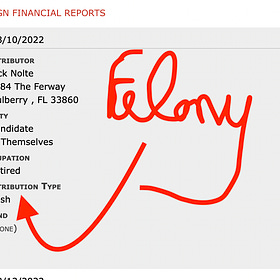Ethical citizenship is the new journalism, which is why corrupt Florida politicians hate both
A new GOP bill to help officials get away with Ethics violations may backfire by accelerating convergence of journalism and citizenship. And it shows the morality of your fake "public servants."
I did not have “personal knowledge” that Polk County School Board Member Lori Cunningham had sold school uniforms in bulk to schools in the Lake Wales Charter School system. Nor did I have “personal knowledge” that principals of those schools would apparently lie to investigators about it. See background here.
I only knew, when I filed my complaint with the Florida Commission on Ethics in January of 2023, that Lake Wales Charter and one Polk district magnet school had publicly identified Lori Cunningham’s company as the preferred or a preferred vendor of mandatory school uniforms.
I wanted the state to take a position: does that clearly stated official preference constitute an unethical conflict for Cunningham in her role as an elected school board member?
The excellent and thorough Ethics Commission investigation of my complaint turned up evidence of wrongdoing far beyond my original knowledge. And that led to a unanimous probable cause finding against Cunningham at the Ethics Commission’s Jan. 26 hearing. It led to what should be a scandal for Lake Wales Charter, which its parents and stakeholders have a right to fully understand.
Officials committing ethics violations against citizens do not invite citizens to witness them
When I arrived at the Ethics Commission for Cunningham’s hearing, the commissioners were in a public session discussing their concerns about the Ethics bills moving through our anti-ethical Legislature. Florida lawmakers, of course, hate the very idea of a commission that might ever hold them personally accountable for anything.
Commissioners were particularly worried about a provision requiring more votes from commissioners than are currently required to find probable cause of an ethics violation.
Then, the day after the Ethics Commission publicly released all the material on its Cunningham investigation last week, I received the following email alert from the Florida Ethics Institute, a non-profit good government organization:
Yesterday a devastating amendment to SB 7014 was filed by the bill’s sponsor Senator Burgess. In particular, Amendment No. 93202 seeks to amend the ethics complaint statute to require personal knowledge of all ethics complaint filings. This would destroy the ability of Floridians to file ethics complaints based upon reports or articles exposing public corruption. A very recent example occurred with ethics complaints filed against Miami Mayor Suarez with the Miami-Dade Ethics Commission that has such a “personal knowledge” requirement. Those complaints had to be dismissed by that commission without investigation because they were based on recent news articles exposing conflicts of interest and gifts issues. The same complaint was able to be re-filed with the Commission on Ethics and investigated because they have no such requirement . . . but they will if this amendment is adopted and then becomes law.
The companion bill HB 1597 does not yet contain such language. Please help us in spreading the word about this issue. How can FEI use our platform to shed light on this terrible move to effectively hide public corruption? I am updating our social media sites now with posts on this issue.
This squishy “personal knowledge” language has been used to dismiss other complaints filed with local ethics functions and other agencies — including my own state complaint related to the DoE/Jefferson charter school scandal.
Here’s a deep dive from excellent Jacksonville reporter/columnist Nate Monroe on these new provisions and their implications for local clean government efforts.
Bottom line quote from Nate’s piece:
One ethics official I spoke with who has concerns about the legislation noted that "people don't commit ethics violations and then invite someone in to witness them."
It is unclear to me if the “personal knowledge” provisions would have prevented the Ethics Commission investigators from identifying the facts that led to the Commissions’s actions against Lori Cunningham.
Get-away-with-it complaint laws will build pressure on *law enforcement* to act
I fully agree with my fellow payers-of-attention to the foibles of official power about the malicious and petty intent of these new provisions. They are being put forward only to help elected or other public officials get away with ethical violations or crimes. They are designed to increase the impunity of power to cheat you. Make no mistake about that.
However, I think our fake “public servants” may be launching this invasion into a changing citizenship battlefield they do not understand. And that may come with unintended consequences for them.
One of the explicit provisions of the new amendments is that a news article isn’t enough for a reader to use as the basis for a successful ethics complaint. This is exactly the reason/excuse the Florida inspector general apparatus used to dismiss my complaint as part of the DoE/Jefferson scandal and coverup.
And yet, that DoE/Jefferson complaint was highly successful as a public pressure tool because I documented every aspect of it publicly.
Much of the content of my complaint and the Tampa Bay Times article that prompted it seems to lie at the heart of the federal grand jury reviewing the DoE/Jefferson scandal. Publicly dismissing a public complaint of serious misbehavior on a gross technicality is not the flex that power thinks it is. It can be weaponized with law enforcement agencies.
I’ve been weaponizing serious complaints with my law enforcement agencies effectively — and embarrassingly — for more than a year. That’s because my local law enforcement agencies — with one really big recent exception — have eagerly outsourced their enforcement jobs to state organizations that take complaints. Take that pressure valve away, legislators, and I can and will and do say this publicly:
See, Mr. and Mrs. State Attorney and Sheriff and Police Chief, state and local government can’t police itself; you have to do it.
Imagine a journalism/citizenship organization that exists *only* to publicly file hard-hitting official complaints?
Moreover, I’ve been on the record for a while now begging reporters/news organizations to adopt a new “norm” in journalism — filing official complaints based on their own reporting. Our fake “public servants” seem to agree with me.
With the “personal knowledge” standard, lawmakers are daring reporters not to luxuriate in the powerlessness their useless “norm” imposes on them. And it’s not a bad dare calculation.
I doubt the Tampa Bay Times as an institution will ever allow a reporter to bring official action based on his or her own reporting. It’s just too foreign to the traditional journalism mindset, which persists even past the death of traditional journalism. (And the rest of the Florida papers are owned by hedge funds.)
However, as the journalism “bundle” that defined the newspaper/institutional journalism model explodes forever, skilled investigative practitioners become free agents; and the endless possibilities of generational change loom.
So imagine this: For just $1 million per year (or even less) some rich person or local government or non-profit looking to make a civic mark/legacy could hire 6 or 7 great reporters and focus them only on generating official complaints.
This would become the de facto clearinghouse of complaints, fed by citizen tips, researched by skilled reporters capable of developing personal knowledge and publicizing it. That would strike very healthy fear into a lot of gross people.
There is small scale precedent for this: Me.
I’ve been doing this for free in my spare time as a civic hobby/commitment to citizenship — and, probably, my ego. For better or worse, I am not one to luxuriate in norms that make me powerless as a citizen.
See my article explaining this approach below:
Four complaints: citizenship can discipline misbehaving "leaders," if we use it
My complaint work, in and of itself, is having an effect in my community and even beyond. Ask anybody paying attention. All four complaints have hit hard in different ways with different complaint bodies. You can trace official, beneficial government or governing body action to each one. And they’re not all done yet.
More than that, the concept is spreading here.
See County Commissioner Neil Combee’s public ethics complaint against another commissioner. It sent the message that leadership/power club in Polk is finally willing to turn on itself, rather than endlessly indulge the eternal mutual back-scratching and false praise and ruling class solidarity that is so toxic for actual public leadership.
Neil Combee adopts the public complaint norm and creates "function" on the Polk County Commission
Neil’s complaint is based on personal knowledge of allegations of wrongdoing he didn’t personally witness. But he can cite and did cite the firsthand witnesses, who are his fellow commissioners. And he filed it himself under his own name. I don’t know how the proposed new rules would affect Neil’s complaint, either.
But I know that filing that complaint and discussing it publicly generated public attention and official discomfort. It is forcing state government to act on it. That’s a good thing, even if that government action proves to be a transparently self-protective, anti-civic dismissal based on a gross technicality built by misbehaving power solely to protect misbehaving power from the citizens it pretends to “serve.”
It would take very little to institutionalize a private citizen function that could regularly transfer this type of personal knowledge into professional, public complaint filing with a host of relevant agencies or governing bodies — not just the Ethics Commission.
This model would also address the essentially non-existent “frivolous” complaint problem. A professional complaint-filing organization isn’t going to file brand-damaging nonsense.
The Ethics Commission vice chair announces the problem
Lest you think this impunity of power/ruling class solidarity thing limits itself to the Republicans who dominate state government, check out the morally and ethically insane statement from Ethics Commission Vice Chair Michelle Anchors at the end of Lori Cunningham’s probable cause hearing.
You can access the recording in this article. Anchors, a Democrat and lawyer from Fort Walton Beach, comes in at about the 27:20 mark.
She voted for the unanimous probable cause finding against Cunningham — but only reluctantly, apologetically, while implying she’ll let Lori off in an actual full evidentiary hearing.
Why?
Because … reasons? And vibes and some sort of charter school class solidarity.
Anchors literally lamented that the evidence her commission’s investigators found was so strong against Cunningham that she had no choice but to find probable cause. Note the parts I’ve put in bold.
I will acknowledge this is difficult. I do work with charter schools. And I understand the challenges. I also believe, even though I don’t know anything about you, that you’ve had almost 20 years of service and that I know was probably with intent to serve. And there is opportunity, again, to deal with this in the future. I don’t often like to rely on that, but given some of the questions we have and the factual situation and the standard of probable cause, that would be my reason.
LOL.
As the investigative materials Anchors had available to her made clear, Lori Cunningham’s uniform sales have been a source of legal and public discussion with her for years … dating back to at least 2012. That’s when her current lawyer himself (my cousin Robin Gibson) advised Cunningham she can’t do the precise thing she is now in trouble for doing.
Anchors really should have stopped with “even though I don’t know anything about you.”
The only reason Lori Cunningham is today having to account for years of sketchy behavior is because I put my name on a sworn complaint that codified endless whispers.
Doing that forced action from Michelle Anchors. She clearly wants nothing to do with disciplining a clearly misbehaving public official she doesn’t know anything about. But the strength of the complaint and investigation forced her to reluctantly acknowledge factual information about that public official she doesn’t know anything about.
That’s power — about the only kind of power we citizens have in this battle for decency.
Other Ethics commissioners seemed far more committed to simply acting professionally on “the factual situation”; and I was impressed with their clarity. But Anchors’ behavior shows just how eager some officials are to avoid doing their jobs if it makes them uncomfortable.
We should not be giving them any more excuses or tools for avoiding their duty.





